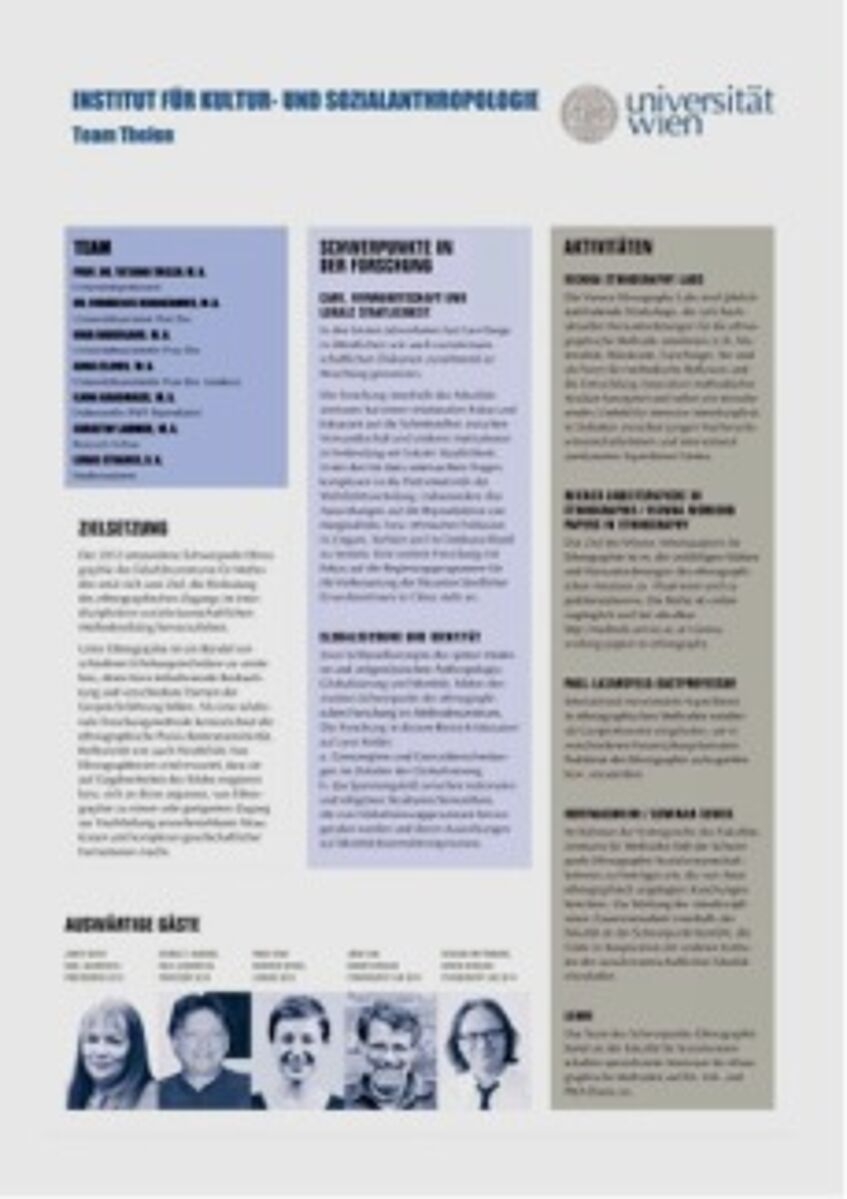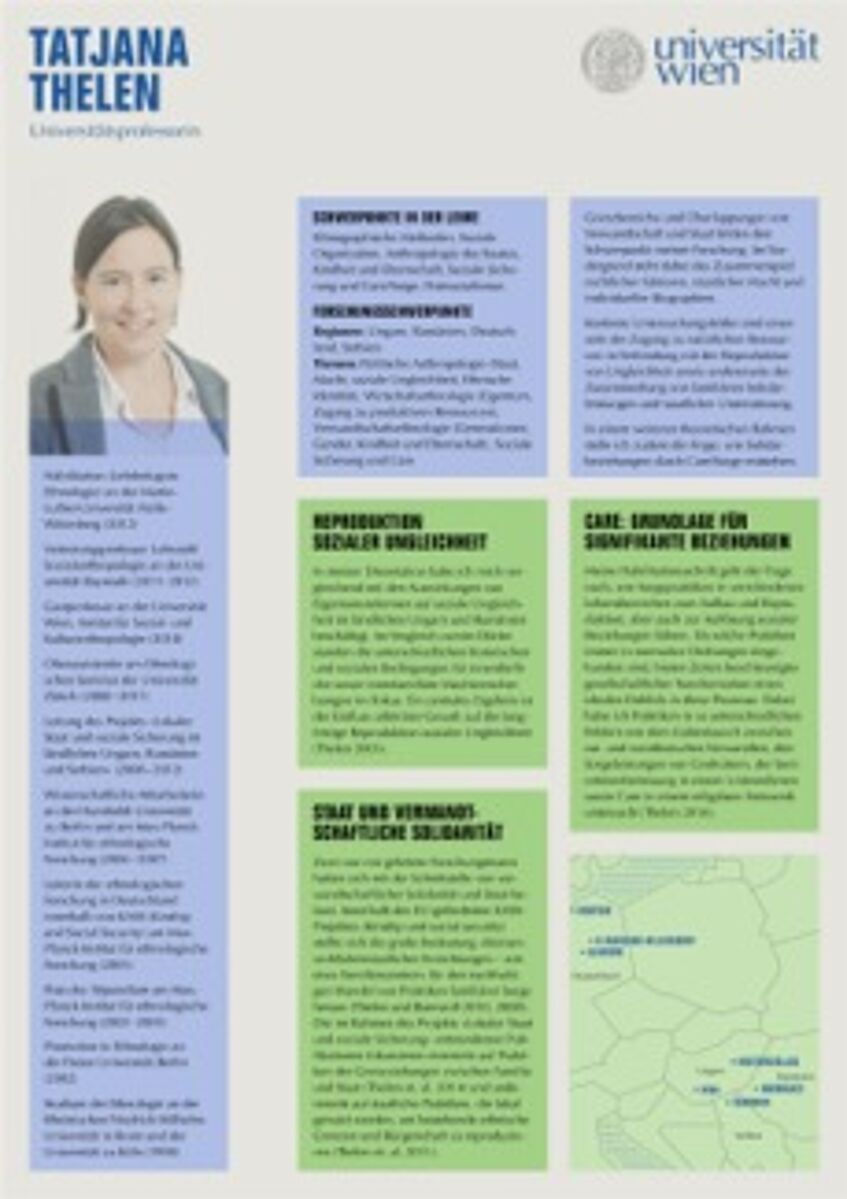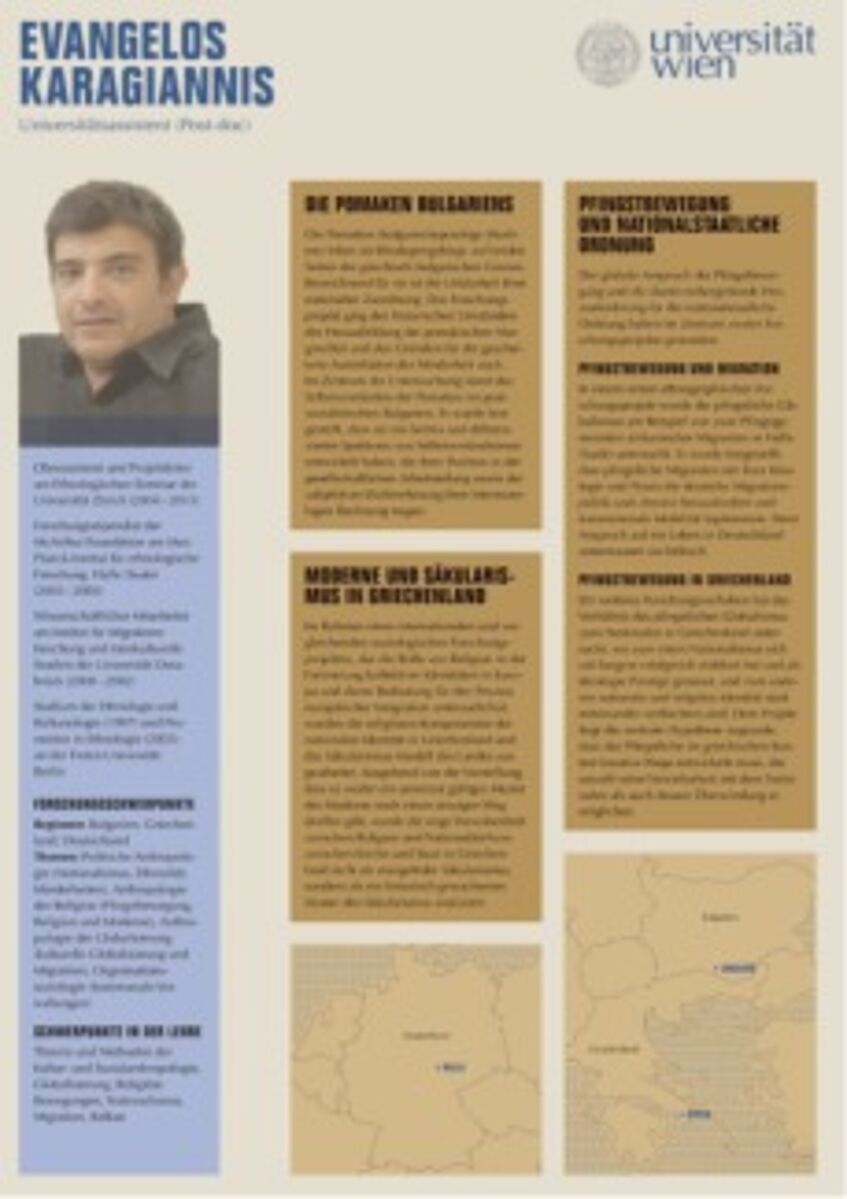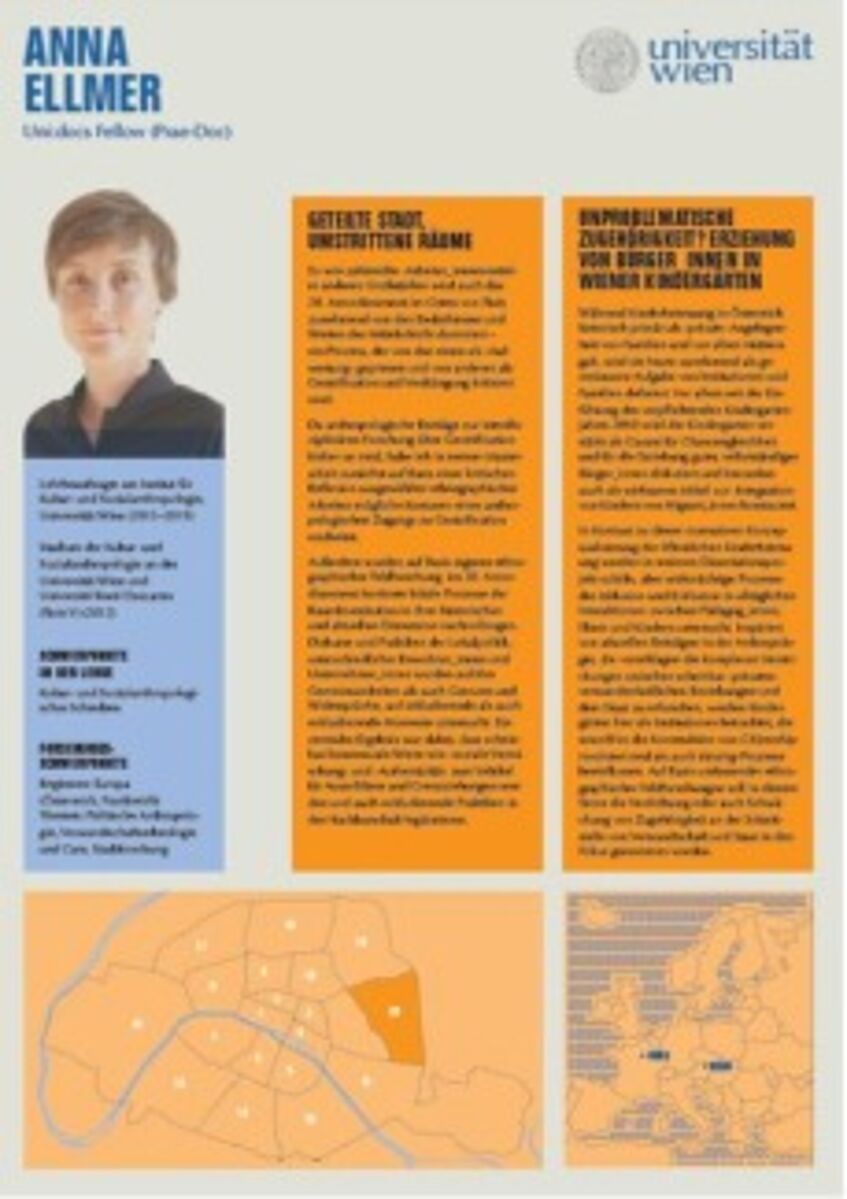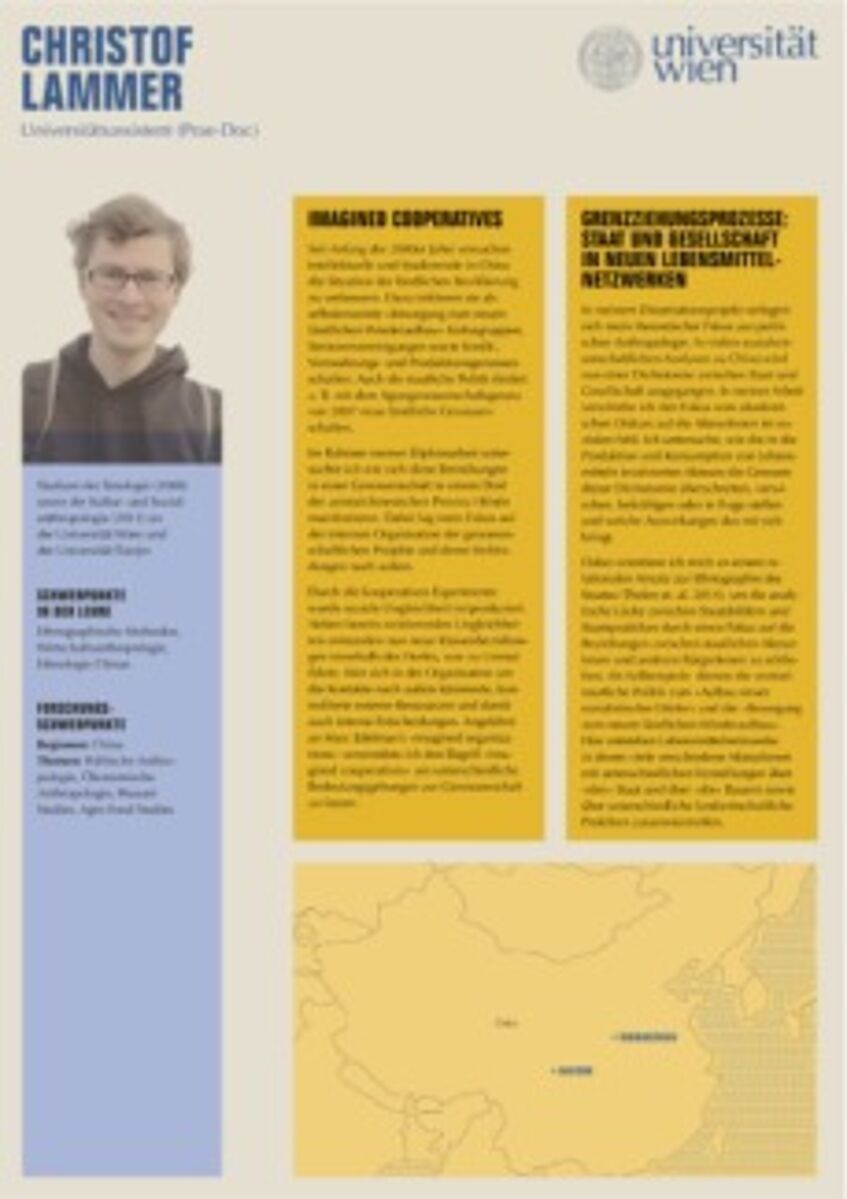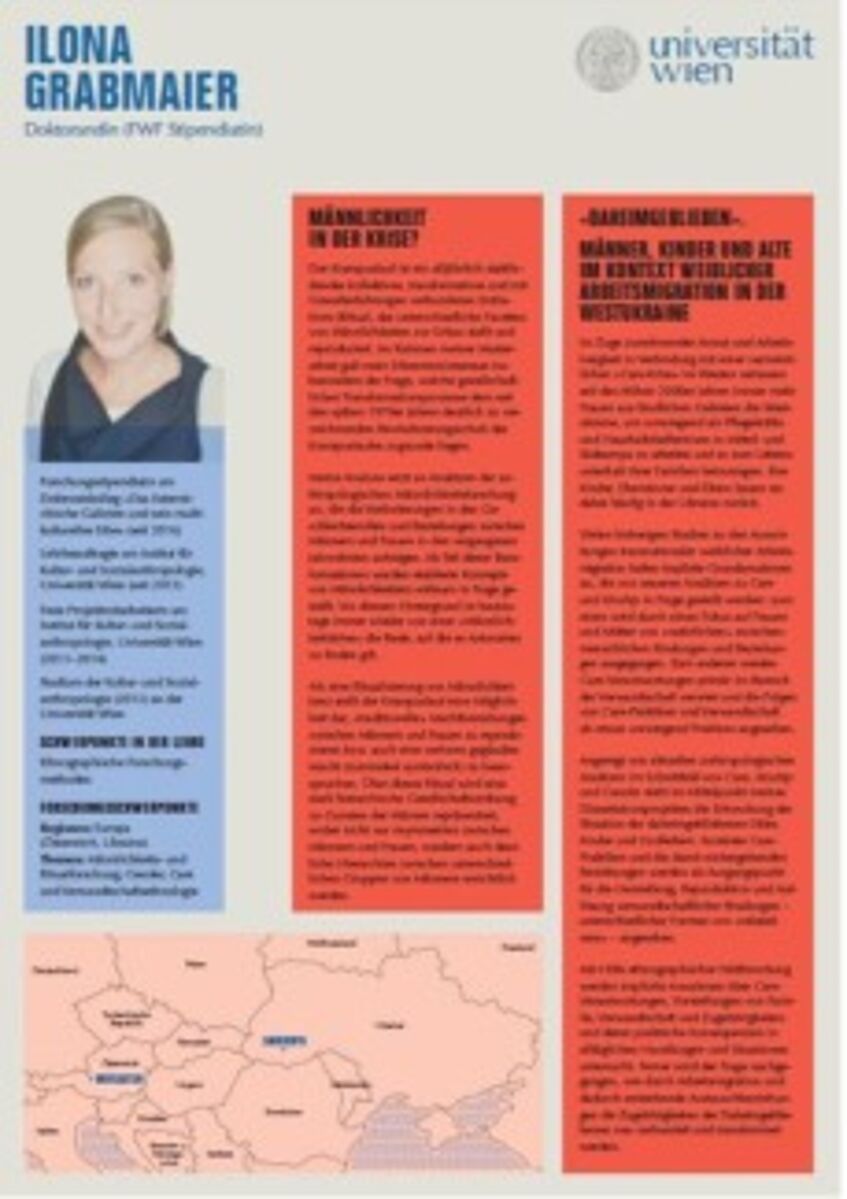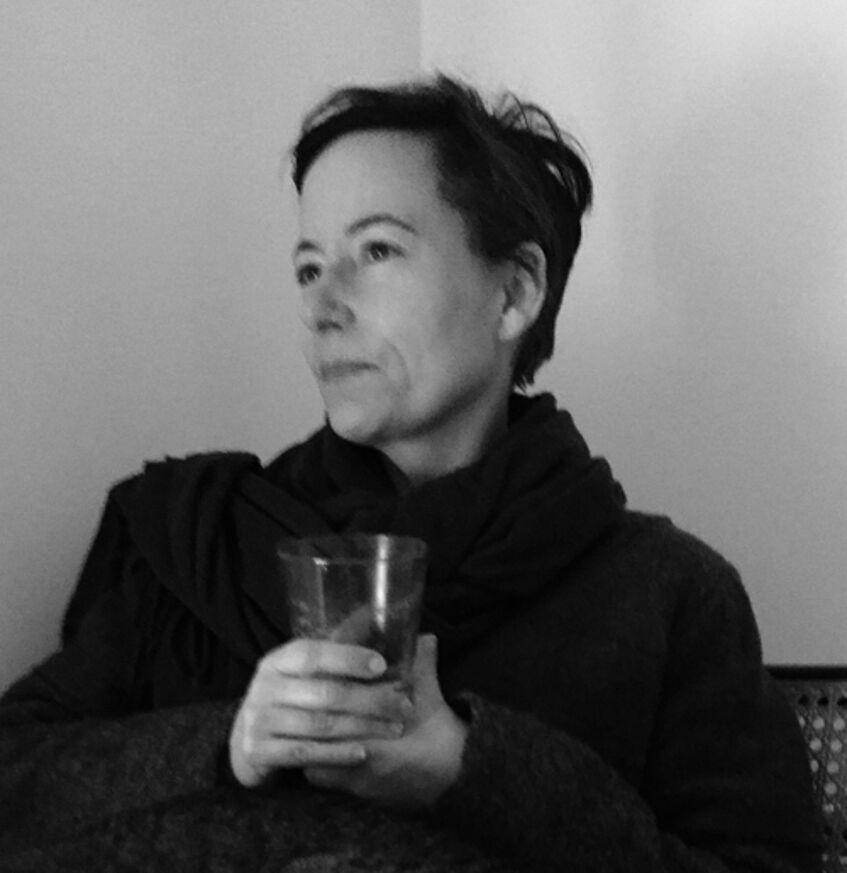
Univ.-Prof. Dr. Tatjana Thelen
Univ.-Prof. Dr. Tatjana Thelen
Universitätsprofessorin
Stv. Studienprogrammleiterin Doktorat: Vienna Doctoral School of Social Sciences (ViDSS)
Stv. Sprecherin der ViDSS
Mitglied des Steering Committees der ViDSS
Vize-Sprecherin der Forschungsplattform Transformations and Eastern Europe
Gründerin von https://www.univie.ac.at/cast
Herausgeberin der Wiener Arbeitspapiere zur Ethnographie (WAPE)
Initiatorin der Vienna Ethnography Laboratories (Ethnolabs)
2025: Visiting Research Fellow at the New School (US)
2023: Distinguished Visiting Austrian Chair, Stanford University
2020-21: Fellow am Institute for Advanced Study (IAS), Paris
2016-17: Fellow am Zentrum für interdiszplinäre Forschung, Universität Bielefeld
Kontakt
Institut für Kultur- und Sozialanthropologie
Universitätsstraße 7, 1010 Wien
NIG, 4. Stock
Raum: B0404
T: +43-1-4277-49560
E-Mail: tatjana.thelen@univie.ac.at
Sprechstunden
Keine reguläre Sprechstunde im SoSe 2025 (Forschungsfreisemester).
Bei Rückfragen wenden Sie sich an hanna.vietze@univie.ac.at
Forschungsschwerpunkte
- Verwandtschaft, Recht und Staat
- Ökonomie, Eigentum und sozialer Wandel
- Care, Differenz und soziale Sicherung
- (Post)sozialistische Gesellschaften
- Relationale Theorie
Kurzbiographie
Tatjana Thelen is a full professor at the Department of Social and Cultural Anthropology at the University of Vienna since 2012. She is currently writing on the role of "political atmospheres" in iterative demarcations of state boundaries, in ways that reinforce or forge belonging. This study traverses multiple social-science disciplines and diverse European landscapes to show that such atmospheres, as meaning-making practices generating nascent critique, are not only impacted by institutions, the state and political change but also profoundly shape them.
Having studied social anthropology at the Universities of Bonn and Cologne, her academic journey began with an ethnographic exploration of economic transformations in postsocialist Hungary and Romania. With a specific focus on property relations, this research formed the basis of her dissertation at the Free University of Berlin in 2002. Generating insights into persistent biases prevalent within the social sciences, particularly on East and Southeast European societies, this phase of ethnographic work also highlighted the broader adverse consequences of relying on entrenched preconceptions about these regions.
She was involved in developing a relational approach to the state as Senior Researcher in the Working Group of Legal Pluralism at the Max Planck Institute for Social Anthropology in Halle (Saale). Shifting her ethnographic focus to eastern Germany, she developed care as an analytic concept bridging the fields of economic and political anthropology, demonstrating its centrality to social organisation. A Volkswagen-funded project on access to natural and state resources in rural areas allowed her to continue this line research through fieldwork in Hungary, Romania, and Serbia. Increasingly, the epistemic consequences of the separation of kinship and state became an additional focus of her research. This question was also at the heart of an interdisciplinary research group at the Center for Interdisciplinary research in Bielefeld, which she headed with colleagues from Los Angeles, Zurich, and Bayreuth.
Tatjana Thelen was the Distinguished Visiting Austrian Chair at Stanford for the academic year 2023, Fellow at the Institute for Advanced Study in Paris in 2020/21, and is co-directing the Research Platform for the Study of Transformations and Eastern Europe.
Ausgewählte Publikationen
- 2025. Diversität im Alter/n: eine sozialanthropologische Perspektive. In: Rudolf Likar, Georg Pinter, Walter Müller, Dieter M. Schmidt (Hrsg.): Lebenskunst Älterwerden. Licht und Schatten des Alterungsprozesses. Berlin: Springer Nature, 197–213. https://doi.org/10.1007/978-3-662-70207-9
- 2024. What's in a family? Kommentar zu Michael Lambeks Behind the Glass. The Villa Tugendhat and its family. In: HAU Journal of Ethnographic Theory 14 (2): 528–532. https://doi.org/10.1086/731137
- 2023. The Politics of Making Kinship. Historical and Anthropological Perspectives. New York, Oxford: Berghahn. (zusammen mit Erdmute Alber, David Sabean und Simon Teuscher) https://doi.org/10.3167/9781800738003
- 2023. Kinship: Old problems and new prospects in the conversation between archaeology and social anthropology. In: Harald Meller, Johannes Krause, Wolfgang Haak und Roberto Risch (Hrsg.): Kinship, Sex, and Biological Relatedness. The contribution of archaeogenetics to the understanding of social and biological relations, 29–34. https://doi.org/10.11588/propylaeum.1280
- 2023. Die Gabe als Kritik – eine sozialanthropologische Perspektive. In: Michael Hutter und Birger P. Priddat (Hrsg.): Geben, Nehmen, Teilen. Gabenwirtschaft im Horizont der Digitalisierung. Frankfurt, New York: Campus Verlag, 65–78.
- 2022. Stategraphy: A Social Anthropological Approach to the State. In: Miriam Fahimi, Elmar Flatschart u. Wolfram Schaffar (Hg.) State and Statehood in the Global South. Cham: Springer, 49-65. https://doi.org/10.1007/978-3-030-94000-3_3
- 2022. Sorge als 'Grenzobjekt': Ein ethnographischer Ansatz zur Unterscheidung öffentlich/privat. In: Bettina Hünersdorf (Hg.) Going Public. Erziehungswissenschaftliche Ethnographie und ihre Öffentlichkeiten. Wiesbaden: Springer VS, 17-31. https://doi.org/10.1007/978-3-658-34085-8_2
- 2022. Politics and Kinship: A Reader. Abingdon, UK: Routledge (zusammen mit Erdmute Alber). https://www.routledge.com/Politics-and-Kinship-A-Reader/Alber-Thelen/p/book/9780367408718
- 2021. Introduction: Measuring Kinship, Negotiating Belonging. Social Analysis 65 (4): 1–22. (zusammen mit Christof Lammer). https://www.berghahnjournals.com/view/journals/social-analysis/65/4/social-analysis.65.issue-4.xml
- 2021. Entfesselte Verwandtschaft. Rezension zu Relations. An Anthropological Account von Marilyn Strathern. Durham, NC: Duke University Press. Soziopolis. Gesellschaft beobachten. Online verfügbar: https://soziopolis.de/lesen/buecher/artikel/entfesselte-verwandtschaft/
- 2021. Care as Belonging, Difference, and Inequality. In: Mark Aldenderfer (Hg.) Oxford Research Encyclopedia of Anthropology. New York: Oxford University Press. https://doi.org/10.1093/acrefore/9780190854584.013.353
- 2021. 养老带来政治归属:时间维度、表征形式以及相互性. Chinesische Übersetzung von “Political Belonging through Elder Care: Temporalities, Representations and Mutuality”, Journal of Qinghai Minzu University 46 (4): 9–21. (zusammen mit Cati Coe).
- 2019. Political belonging through elder care: Temporalities, representations and mutuality. Anthropological Theory 19 (2): 279-299. (zusammen mit Cati Coe) http://journals.sagepub.com/doi/pdf/10.1177/1463499617742833
- 2018. Socialism: Marxist-Leninist-Maoist. In: Hilary Callan (Hg.) International Encyclopedia of Anthropology. Hoboken: John Wiley & Sons. https://doi.org/10.1002/9781118924396.wbiea1836
- 2018. Property. In: Hilary Callan (Hg.) International Encyclopedia of Anthropology. Hoboken: John Wiley & Sons. https://doi.org/10.1002/9781118924396.wbiea2349
- 2017. Reconnecting State and Kinship. Philadelphia: University of Pennsylvania Press. (zusammen mit Erdmute Alber). http://www.upenn.edu/pennpress/book/15744.html, https://www.combinedacademic.co.uk/reconnecting-state-and-kinship
- 2017. Stategraphy: Toward a Relational Anthropology of the State (überarbeiteter Nachdruck). New York: Berghahn Books. (zusammen mit Larissa Vetters und Keebet von Benda-Beckmann). http://www.berghahnbooks.com/title/ThelenStategraphy
- 2015. Care as Social Organisation: Creating, Maintaining and dissolving significant relations. Anthropological Theory 15 (4): 497-515.
Das Team
AssistentInnen
Projektmitarbeiter*innen / Gäste
FWF doc.funds
Marietta Blau Stipendium
ÖAW
Research Platform "Transformations and Eastern Europe"
SowiDocs
Ehemalige
Ehemalige Teammitglieder
Ilona Grabmaier
Ehemalige Gäste
Forschungsschwerpunkte des Teams
Care, Verwandtschaft und Staatlichkeit: Prozesse der Zugehörigkeit und Produktion von Differenz
In den letzten Jahrzehnten hat Care/Sorge in öffentlichen wie auch sozialwissenschaftlichen Diskursen zunehmend an Beachtung gewonnen. Die Forschung innerhalb des Teams hat einen relationalen Fokus auf der (Re-)Produktion wie auch der Auflösung signifikanter Bindungen durch Care. In diesen prozessen drückt sich auch die Bedeutung von Care für politische Subjektivitäten, Zugehörigkeit und die Reproduktion des Staates auf verschiedenen Ebenen aus. Im Mittelpunkt der Einzelprojekte stehen insbesondere Schnittstellen zwischen öffentlichen und privaten Institutionen, wie zum Beispiel Einrichtungen der Kinderbetreuung oder Hilfen für SeniorInnen. Einen Schwerpunkt bilden dabei die Performativität und Auswirkungen wohlfahrtsstaatlicher Praktiken auf die Reproduktion von Marginalisierungen aufgrund von Differenzkonstruktionen. Einen weiteren Fokus bildet die Reproduktion und rekonfiguration von Verwandtschaft und Staat als getrennten Einheiten. Für beide Prozesse sind Translationen global zirkulerienden Ideen und Konzepte zentral.
Relevante Links
- Vienna Ethnography Laboratories (Ethnolabs)
- Wiener Arbeitspapiere zur Ethnographie (WAPE)
- Forschungsnetzwerk Care & State (CAST)
- Paul-Lazarsfeld-Gastprofessuren
- Studienprogrammleitung Doktorat Sozialwissenschaften
- Zentrum für interdisziplinäre Forschung (ZiF), Universität Bielefeld
- LOST Research Network
- Visegrád Anthropologists' Network
- Doktoratskolleg Galizien

